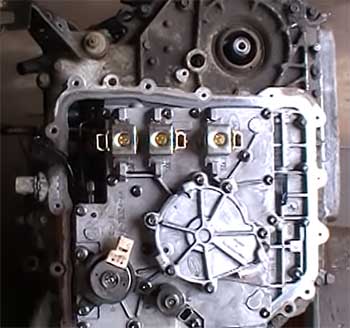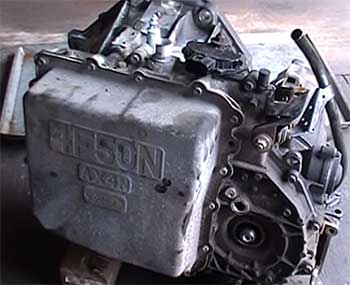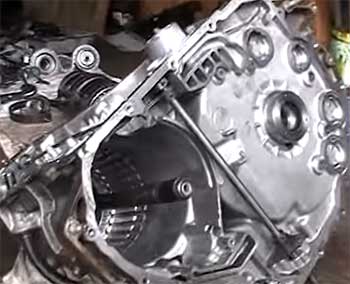The AX4N transmission is a popular transmission model used in many Ford vehicles, including the Taurus and Windstar. Even though this transmission is renowned for its dependability and toughness, it is not without issues.
In this article, we’ll look at some of the most typical AX4N transmission issues and discuss solutions.
Common Problems with AX4N Transmission
- Delayed Shifts

One of the most common problems with AX4N transmission is delayed shifts.
This problem occurs when the transmission takes longer than usual to shift gears, resulting in poor acceleration and reduced fuel efficiency.
A malfunctioning transmission control module, low transmission fluid levels, worn-out transmission parts, and other issues can all contribute to delayed shifts.
- Overheating
Another common problem with the AX4N transmission is overheating. Transmission fluid breakdown brought on by overheating can lead to decreased lubrication and increased wear on transmission parts.
Several things, such as a blocked transmission cooler, low transmission fluid levels, or a broken thermostat, can contribute to overheating.
Also Read: Differences Between Valair And South Bend Clutches.
- Fluid Leaks
Fluid leaks are another common problem with AX4N transmission. Leaks can occur at various points in the transmission system, including the pan gasket, the transmission cooler lines, or the front pump seal.
Fluid leaks can cause the transmission to lose fluid, resulting in reduced lubrication and increased wear on transmission components.
- Slipping Gears
Slipping gears are a common problem with the AX4N transmission. This problem occurs when the transmission slips out of gear while driving, resulting in poor acceleration and reduced fuel efficiency.
Many things, such as low transmission fluid levels, worn-out transmission parts, or a broken torque converter, might make gears slip.
- Torque Converter Failure
Torque converter failure is another common problem with the AX4N transmission. When the torque converter malfunctions, it can lead to a number of transmission issues, including slipping gears, sluggish shifts, and decreased fuel efficiency.
The torque converter is in charge of transmitting power from the engine to the transmission. Torque converter failure can be caused by a variety of factors, including low transmission fluid levels, overheating, or a malfunctioning torque converter clutch.
- Solenoid Failure
The AX4N transmission uses solenoids to control the flow of transmission fluid and shift gears. Solenoid failure is a common problem with this transmission model, and it can cause a variety of transmission problems, including slipping gears, delayed shifts, and reduced fuel efficiency.
Solenoid failure can be caused by a variety of factors, including electrical issues, low transmission fluid levels, or a malfunctioning transmission control module.
- Hard Shifting
Hard shifting is another common problem with the AX4N transmission. This problem occurs when the transmission shifts gears with excessive force, resulting in a harsh and jarring driving experience.
A malfunctioning transmission control module, low transmission fluid levels, or worn-out transmission components are just a few of the causes of hard shifting.
Addressing Common Problems with AX4N Transmission
- Regular Maintenance

Regular maintenance is crucial for preventing transmission problems with the AX4N transmission.
Regular fluid changes, filter changes, and inspections can help identify potential problems before they become more serious.
- Addressing Fluid Leaks
Fluid leaks should be addressed promptly to prevent transmission damage. Leaks can be repaired by replacing damaged gaskets, seals, or lines.
- Addressing Overheating
Overheating can be addressed by ensuring that the transmission fluid is at the appropriate level, replacing a malfunctioning thermostat, or replacing a clogged transmission cooler.
- Addressing Solenoid Failure
Solenoid failure can be addressed by replacing the faulty solenoid or repairing any electrical issues that may be causing the failure. In some cases, a complete transmission rebuild may be necessary.
- Addressing Torque Converter Failure
Torque converter failure can be addressed by replacing the faulty torque converter or rebuilding the entire transmission. In some cases, the failure may be caused by low transmission fluid levels or overheating, which should be addressed before replacing the torque converter.
- Addressing Delayed Shifts and Hard Shifting
Delayed shifts and hard shifting can be addressed by replacing worn-out transmission components, ensuring that the transmission fluid is at the appropriate level, or repairing any electrical issues that may be causing the problem. In some cases, a transmission rebuild may be necessary.
Also Read: Problems With Toyota 4Runner Transmission Solenoid.
Is AX4N Transmission Worth It?
Let’s see why people go for it:
- Durability

The AX4N transmission is known for its durability, making it a great investment for your vehicle.
The transmission is designed to withstand the wear and tear of regular use and can handle high mileage without needing significant repairs.
Your car will be dependable and able to last for many years thanks to this durability.
- Smooth Shifting
The AX4N transmission provides smooth shifting, ensuring a comfortable and enjoyable driving experience. The transmission is designed to shift gears seamlessly, reducing the jarring and jerky movements that can be common with other transmissions.
This smooth shifting can also help reduce wear and tear on other components of your vehicle.
- Fuel Efficiency
The AX4N transmission is designed to be fuel-efficient, helping you save money on gas over the life of your vehicle. The transmission is optimized to ensure that your engine operates at the most efficient RPM range, reducing fuel consumption and emissions.
Your carbon footprint can be decreased because of this fuel efficiency, which will help create a more sustainable future.
- Low Maintenance
The AX4N transmission requires relatively low maintenance, reducing the overall cost of ownership over the life of your vehicle.
The transmission is designed to be reliable and long-lasting, requiring only regular fluid changes and filter replacements to maintain optimal performance. You may save time and money on repairs and maintenance by choosing this low-maintenance need.
- Versatility
The AX4N transmission is versatile, making it suitable for a wide range of vehicle types and driving styles. The transmission, which can manage both city and highway driving, is found in numerous Ford models, including the Taurus and Windstar.
This versatility ensures that the transmission can meet the needs of different drivers and their vehicles.
- Smooth Acceleration
The AX4N transmission provides smooth acceleration, ensuring that your vehicle responds quickly and precisely to your inputs.
The transmission is designed to deliver power smoothly, reducing the jarring and jerky movements that can be common with other transmissions. This smooth acceleration can also help reduce wear and tear on other components of your vehicle.
- Cost-Effective
The AX4N transmission can be a cost-effective solution for your vehicle. During the course of your vehicle’s life, the transmission should only need a small amount of maintenance and repairs due to its robust and dependable design.
Additionally, the transmission is optimized for fuel efficiency, helping you save money on gas over time. This cost-effectiveness ensures that the transmission provides long-lasting value for your investment.
- Easy to Service
The AX4N transmission is designed to be easy to service, reducing the overall cost and time required for repairs and maintenance. The transmission is designed to be accessible, allowing technicians to easily access and service transmission components.
The time your vehicle is out of commission is decreased thanks to the speedy and effective completion of repairs and maintenance due to this simplicity of service.
Conclusion
While the AX4N transmission is known for its reliability and durability, it is not without its problems. Common problems with this transmission model include delayed shifts, overheating, fluid leaks, slipping gears, torque converter failure, solenoid failure, and hard shifting.
Fortunately, many of these problems can be addressed by regular maintenance, prompt repairs of fluid leaks, addressing overheating, replacing faulty solenoids or torque converters, and replacing worn-out transmission components.
It is important to address these problems promptly to prevent further damage to the transmission and ensure a safe and comfortable driving experience.




Correct me if I’m wrong,
shift solenoids are on off while the TCC and EPC solenoids are PWM?
Yes we love our 2005 Ford Freestar with the AX4N transmission. We are on transmission number 2 and possibly going for a performance built 3rd trans by Xtreme performance. It’s a project I don’t need but pretty much have to do. Which oil cooler should I install for added trans cooling and where to locate it? How difficult is it to change trans oil and filter? How do I find a mechanic willing to work on a 20 year old vehicle? How can I ensure the work is done right the first time?